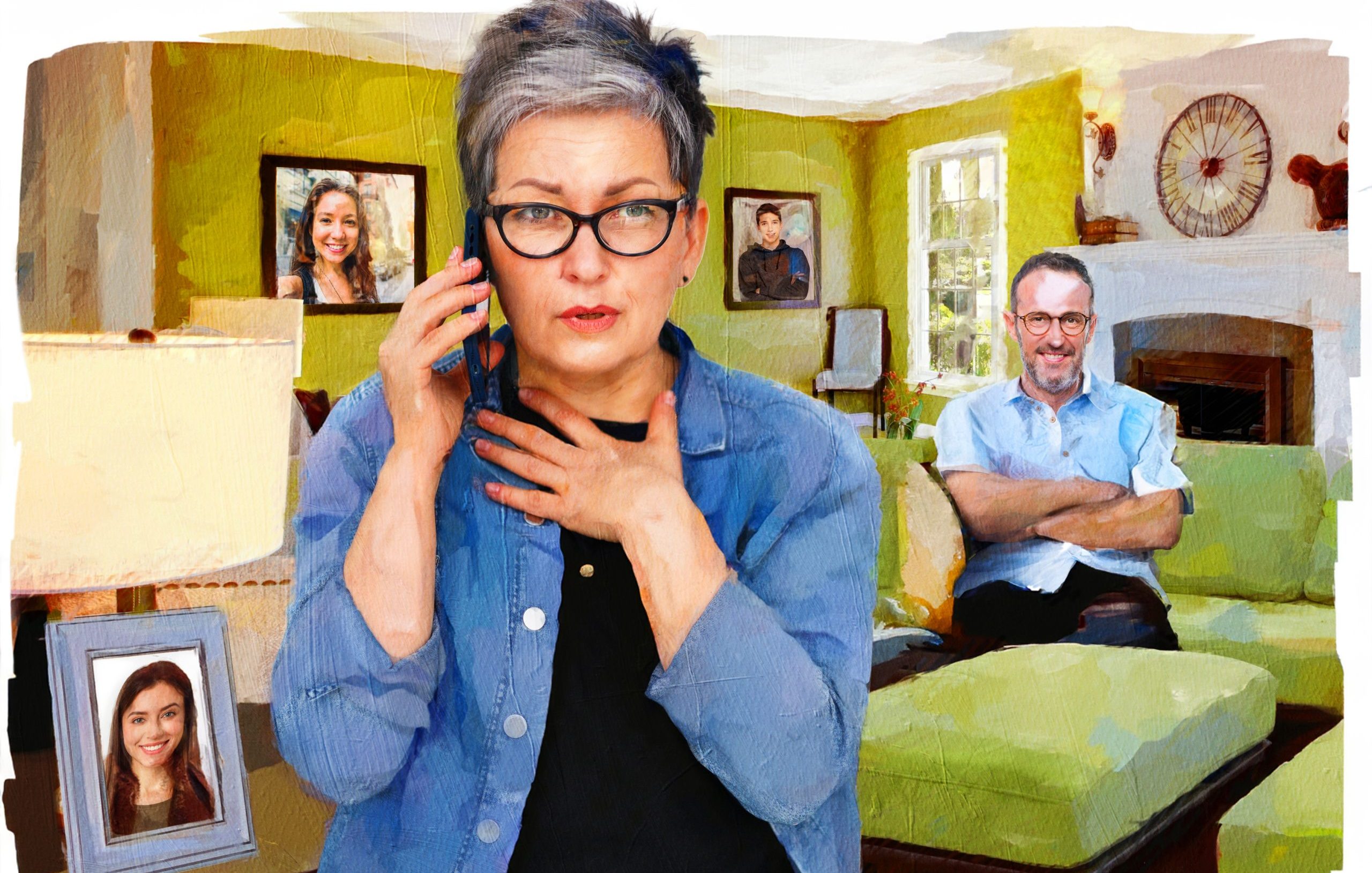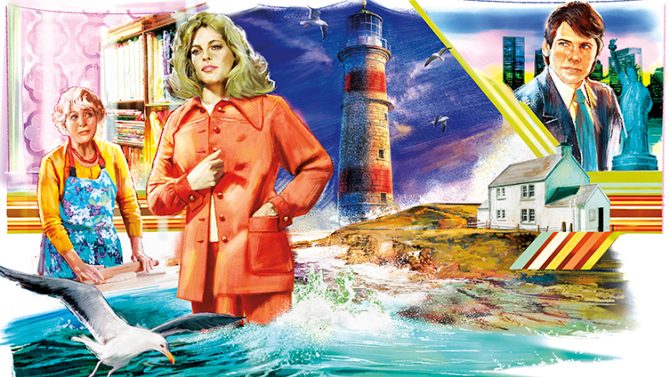Crossing Bridges
Leonie was used to her dad worrying about her – now the tables were turning!

Illustration credit: Jim Dewar.
Subscribe to The People’s Friend! Click here
Leonie was used to her dad worrying about her – now the tables were turning!

Illustration credit: Jim Dewar.
MODERN LIFE SHORT STORY BY EIRIN THOMPSON
Leonie was used to her dad worrying about her – now the tables were turning!
When I went to university in the 1980s, I thought of the experience as a bit of an adventure.
Moving to a city meant access to live music gigs, better high street shops and bars that weren’t propped up by old timers.
I never meant to stay away.
I assumed that, after graduation, I’d come back and live somewhere near Mum and Dad.
But I had a student job by then, working evenings in a theatre, and there were so many more opportunities for full-time employment in a bigger centre than in the sleepy little town where I’d grown up.
“It won’t be forever,” I told Mum on the phone when I accepted a post in the university library. “I dare say, when I’m ready to start a family, I’ll come rushing back home.”
“See that you do,” Mum replied. “I don’t want to be a long-distance granny!”
Every autumn I enjoyed giving tours of the library to freshers, all of whom were suitably impressed by what was, for most, their first experience of a library of such size.
I adored my library job. It was a vocation and a privilege.
To be fair, Mum and Dad didn’t pressure me to move closer to them.
When I went home for holidays, Mum would cook me delicious food and do my laundry with a playful smile.
There was no direct lobbying for my return, though.
I appreciated being spoilt on those occasions, but my work, my friends and colleagues, my social activities and even my favourite bars and restaurants were all in the city by then.
“How were things in Sleepyville?” my flatmate, Michelle, never failed to ask when I returned to the city.
“Nice,” I told her. “I caught up with a few of the gang from school and ate my body weight in roast dinners.”
“I’m sure your parents are lovely people, but kill me if I ever show signs of moving to the provinces,” Michelle replied. “I’m terrified of drowning in a sea of Tupperware.”
About a year after I started working in the library, I met my boyfriend, Will. He was a new tutor in the English department where I had studied.
It all began when I helped him to find a couple of texts that had been misfiled – when you work with the books every day, you get an idea where someone might have replaced them by mistake after a loan.
“Let me take you for a coffee to say thanks,” Will suggested.
I liked his green eyes and his long overcoat, which made him look like Terry Hall.
“OK,” I agreed.
Coffee went well and Will asked to see me again.
We attended a couple of theatre shows and then went for dinner.
I really liked him. He was good company, with plenty to say on a range of subjects, yet without being what you might describe as “opinionated”.
When Will asked me to marry him, I said yes.
Mum cried when I told her.
“I’m happy for you, Leonie. Of course I am. Will’s a lovely young man and your dad and I are very fond of him.
“But you’ll never come back here to live now,” she added sadly. “Not when Will’s employed by the university.”
On our wedding day, Mum and Dad couldn’t quite hide the fact that it was a bittersweet experience for them.
They were pleased that I was entering an important new stage of my life, but it also dashed any hopes they held of my coming back to live where they could see me every week, if not every day.
“When you retire, you could always move near to me in the city. There are some great apartments,” I suggested.
But I think we all knew that they preferred the slower rhythms of life in a small town.
When Kelly was born, my parents came and stayed with us for the first 10 days to help us.
Their assistance was much appreciated.
Kelly was a colicky baby and, after a few weeks of sleep deprivation, Will and Mum decided that I should stay with my parents for a while so that I could get some rest.
Dad drove up to collect me with Mum in the front passenger seat and the boot filled with meals to cram into our fridge and freezer for Will.
By the time Reuben arrived, Mum and Dad had got used to coming up to us on the train.
This time, they played endlessly with Kelly while somehow managing to cook as well as helping me with a second baby.
In the afternoons, Mum would put Reuben in his pram and she, Dad and Kelly would go for long walks while I slept.
They were wonderful.
“Thanks, Mum and Dad,” I said. “For supposedly long-distance grandparents, you’re extremely hands-on!”
Eventually I went back to work in the university library, and Kelly and Reuben entered daycare and then school.
Will then got a promotion and we moved from our poky little terraced house to a semi-detached three-bedroom Victorian villa with a garden.
Mum and Dad loved the new place.
“I’m not sure we could swing a cat, but it certainly feels like a whole lot more space,” Will told them.
“I could put up a couple of swings in the garden,” Dad offered. “Only if you want, though.”
“That would be great,” Will agreed. “Thanks.”
Mum washed the lunch dishes and I dried them and put them away.
“If there was ever any chance of you moving back near us, it’s gone now, isn’t it?” Mum asked me. “This place feels like a forever home.”
“I never planned it this way,” I answered, putting an arm around her shoulders. “It just sort of happened.”
Mum turned and hugged me.
“I know, Leonie. I have absolutely no criticism for any of your decisions – every one of them made a great deal of sense.
“We miss you – that’s all.”
The kids grew up, Will was made a professor and I continued working at the library as well as running after two teenagers until they, too, went off to uni.
Then Mum died quite suddenly.
It was during the pandemic, but after the most stringent restrictions had been lifted, so it was possible to have a small funeral.
“Come and stay with us for a while, Dad,” I suggested, as Will, the children and I walked with him across the graveyard to the waiting limousines. “I can come back to the house and help you pack a couple of cases.”
“That’s very kind,” Dad replied. “But, to tell you the truth, I’d rather be in my own home.
“And I think Laura would have understood that, too.”
“In that case, let me join you for a few days,” I said.
Dad sighed.
“Indulge me,” I added.
“All right.”
Kelly got married in Las Vegas. I wanted to kill her.
“It’s her choice, Leonie,” Will reminded me with an infuriating calmness. “She’s old enough to make up her own mind.
“We had the wedding we wanted, and so has she.”
“But what about my role?” I complained. “I’m meant to spend a month of Saturdays going round wedding dress shops with her.
“We’re meant to discuss reception venues and what food to serve.
“She’s meant to demand a live band and we’re meant to hold out over the expense, before eventually agreeing that it’s her big day and she should have exactly what she wants.”
“She has gone for exactly what she wants,” Will pointed out. “It wasn’t what you wanted for her, but that’s not really the most important thing here, Leonie.”
Then Reuben decided to take a career break.
“Career break?” I shrieked. “You’ve only just stepped on to the career ladder!”
He wanted to backpack around Australia.
“Seriously?” I asked. “You couldn’t have found somewhere further away.”
“Actually, New Zealand is further,” he told me.
“Leonie, you might as well accept it,” Will said, hugging me gently. “They’re their own people now.
“All we can do is make it great when they come home to us, so that they always will.
“And while they’re away, we can find other interests. I’m thinking of learning Spanish – it’ll be good for the little grey cells.”
“I suppose I could look into courses, too,” I concurred. “And I might go and spend a week with Dad.
“He must get lonely these days.”
But when I rang Dad to make the arrangements, he had a surprise in store for me.
“Don’t come this week, if you don’t mind, Leonie. I’m afraid I won’t have the room.”
“You won’t have the room?” I repeated, mildly concerned. “How many bedrooms do you sleep in?”
“Just the one. But Bohdana and Fedir need the other two.”
“Sorry, Dad, who?” I asked.
“Bohdana and Fedir – my lodgers.”
This was getting very strange. I wasn’t sure what to ask next.
“Since when did you have lodgers in the house?”
“Since I heard the appeal on the radio for people with spare bedrooms to take in Ukrainian refugees.”
What if my dad had been scammed?
“Have they moved in yet?” I asked.
“Yes. They’re here now.”
Oh, no. You heard about tricksters like this, taking advantage of older folk.
“Dad, I need you to gather up all your bank cards and anything like that, and Mum’s good jewellery.
“I want you to take it next door to the Armstrongs.”
The Armstrongs were reliable and would understand.
“I’m on my way, Dad. I’ll be as quick as I can.”
“But Leonie –”
“It’s going to be fine, Dad. Everything’s going to be all right.”
It seemed to take an eternity to get through the city traffic and on to the road back to my former home.
By the time I arrived, my shoulders were up to my ears and my face was flushed with concern.
Dad came to meet me, as usual, on the front step.
“I still don’t know why you’re here,” he began. “It’s lovely to see you, but I don’t know where I’m going to put you.”
I gripped him in a brief hug, then barged into the house.
There, in the living-room, a youngish woman was folding a T-shirt of Dad’s on the ironing board and adding it to a large pile.
“Hello,” she said. “I’m Bohdana. You must be Leonie. It’s a lovely name.”
Her English was good and her tone was friendly.
She unplugged the iron and stepped away from the board.
“I’ll put this away to give you some space,” she said. “Can I make you a cup of tea?”
“Yes, please, Bohdana,” Dad piped up. “And there are chocolate biscuits in the box behind the tea bags.”
As soon as she left the room, I glared at Dad.
“Dad, what if you’re being scammed?” I hissed. “These people could exploit you.”
“Ah! So that’s what’s brought you rushing here. Sorry, love, in that case you’ve had a wasted journey. I can assure you that everything is above board.
“I applied as a host through a registered scheme, and I’ve had both the council and the church come round to make sure everything was suitable and to offer me any support I might need.
“Did you really think I’d open my home – the home I shared with your mother and with you – to someone I wasn’t certain of?” he asked.
“Admittedly, Bohdana seems very nice, but what about this Fedir?
Is he her boyfriend?”
“Fedir is Bohdana’s son. He’s thirteen and he’s currently out at a social event run by the Sunday school.
“He’s a whizz with computers and he’s going to help me Zoom Reuben in Australia,” Dad replied.
“I could help you with that!”
“I know, but sometimes it’s better when you have someone in the room with you.”
Bohdana returned with a tray of tea for the three of us.
“I understand you are an English scholar,” she said to me.
“Um . . . yes. I studied English literature at university,” I replied.
“I am a big fan of the Brontës. Mike is taking us to visit the Parsonage Museum at Haworth one day soon.”
Whatever I was expecting, it wasn’t that.
“Bohdana’s husband is a paramedic,” Dad chipped in. “He’s been moved from civilian duties to tend to the Ukrainian army.”
“He loves American literature,” Bohdana volunteered. “Kurt Vonnegut, especially. Also Joseph Heller – ‘Catch-22’.”
“He’d get on well with my husband,” I couldn’t resist answering.
“Fantastic!” Bohdana cried. “When peace returns, we must all get together.”
It was, frankly, impossible to suspect Bohdana of base motives.
And when Fedir was brought home from the Sunday school party, blowing a party hooter and giggling, it was harder still.
“Tell you what, I’m going to pop out for some extra bread and milk, since you weren’t expecting me.
“I’ll be back shortly,” I told Dad.
I drove my car to the supermarket, found a parking space and took out my phone.
I didn’t know if anyone would be answering calls at the council at this time, so I rang the vicar.
Yes, he told me, my dad was part of a properly registered scheme.
There had been close checking of the backgrounds of both Dad, as a host, and the Ukrainian family who were his guests.
He would not be left to do everything for them by himself – there was a package of support available and church volunteers would be making sure he availed of it.
“So you don’t think I need to worry?” I asked.
“On the contrary,” the vicar replied. “I think it’s going to be good for your father to have young people in the house.
“Your dad has been paired with a very capable young mother and her studious son. It’s a very suitable match, I’d say.
“And Leonie, remember Matthew, Chapter 25: For I was a stranger and you invited me in.”
I sighed.
“Thank you, Reverend.”
The Ukrainian arrivals in my sleepy home town were a huge hit.
They applied themselves to cooking, cleaning, gardening, child-minding and offering their time and expertise wherever it was needed.
Some families stayed for a short time, while they made more suitable arrangements to stay with relatives in other countries.
Some chose to return to Ukraine, despite the conflict.
Others, like Bohdana and Fedir, remained.
“It’s been wonderful, really, how it’s worked out,” Will remarked one evening when I came off the phone from Dad.
“I know,” I agreed. “Bohdana and Fedir have been such great company for him these past two years.
“It’s tragic that they had to leave their home, but I am so glad that Dad was able to offer them somewhere safe and warm.”
“Do you worry about what will become of Mike when his Ukrainian family eventually go back to their home country?”
“I’ve decided not to,” I replied. “Mum and Dad coped when I left home, and Dad coped again when Mum passed away.
“Sometimes people have a greater ability to adapt than we credit them with.
“For now, we all have good lives. We’ll cross the next bridge when we come to it.”
My phone rang.
“It’s Kelly,” I told him, reading the screen of my mobile. “Hello, love – how are things?”
I sat up straight in my seat.
“Oh, wow!” I exclaimed. “Congratulations!
“That’s fantastic news! How many weeks are you?”
“I think we’ve just found our next bridge,” Will murmured.
But I don’t have to cross bridges, I realised.
I get to cross bridges.
Enjoy exclusive short stories every week inside the pages of “The People’s Friend”. On sale every Wednesday.

Deborah Siepmann


Alison Carter


Teresa Ashby

Beth Watson

Alyson Hilbourne

Katie Ashmore

Kate Hogan

Liz Filleul

Beth Watson

Alison Carter